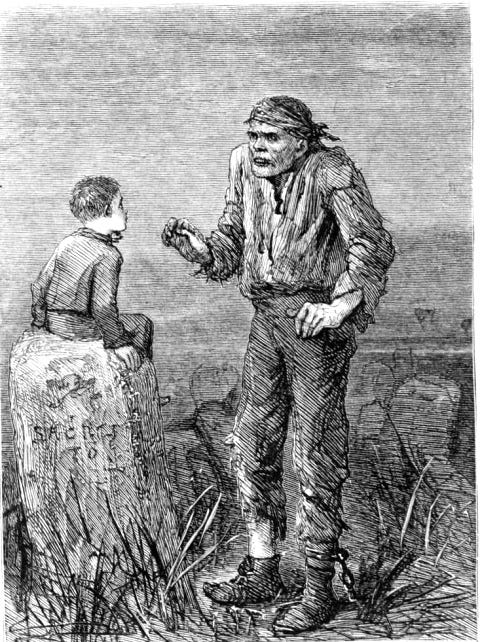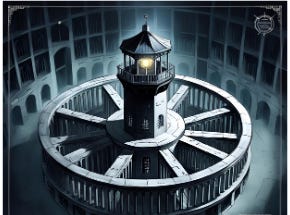I See You
And, They Do, Too
Hello Friends,
When I was in graduate school (a million years ago) working on a degree in English, I came upon a book called The Novel and the Police by a professor (taught at Harvard, Columbia, and Berkley) named D. A. Miller. His book appeared in print at the very time I was studying Charles Dickens' Great Expectations.
Awesome for me, as I was writing a paper on it and needed some inspiration.
In his book, Miller discusses a series of scenes in Great Expectations. The first of which is when the novel's main character, Pip, experiences a chance encounter with a criminal, Magwitch, who threatens Pip to bring him food and a file (to remove his prison chains).
In a following scene, Pip, considering how he is going to swipe the items to give to Magwitch, is sitting in his kitchen with his family when there is a knock at the door.
It is the police.
They are making the rounds in the neighborhood, asking if anyone has seen a recently escaped convict.
(Disclaimer: I haven’t read either of these books in over 30 years, but this is how I remember it…)
Miller points to this Victorian trope of an authority figure (the police) appearing at the time a character (Pip) is contemplating a crime (stealing the food and file) or otherwise struggling with a moral dilemma.
Truthfully, I don't actually like Great Expectations or much of Victorian literature, even though I read a lot of it during those 2 years at Northeastern. I find it long and too descriptive. If you have read my books, you know I'm more plot driven (a literary flaw; I suppose).
But what stood out to me was Miller's take on that one scene—the police's appearance when Pip is in a legally and morally compromised position.
In his book, Miller goes on to discuss the Panopticon, a theoretical of a type of institutional building where detainees are kept in a cell, centrally located in a room, with no place to hide, surrounded by another chamber where others can observe.
The assumption is that every action is seen.
But, the interesting thing is that in the Panopticon, the prisoner never knows whether or not they are attentively being watched. And, the theory suggests that simply possessing the prospect of being observed keeps captives (or anyone really) in line. It's a trope explored in lots of literature (not just Victorian novels, consider 1984), film, and culture. This instance of social behavior has been widely studied and commented on.
In general, people aren't maleficent if they think there is a chance of being seen or caught. Which is why our current moment of everyone posting everything they do online is so weird.
As a society, we've not only accepted and, in many ways, expect and embraced, that we are being watched. We are actively participating in it by allowing others to watch us through selfies and social media posts.
We purchase all kinds of technology, such as video doorbells and security cameras, smart voice devices, and cell phones (and other devices) with tracking GPS. We have been sold that this type of surveillance is not only convenient (and trendy), but necessary because our world is so dangerous.
Obviously, this contains a plethora of social and political implications. People are easier to control when they self-police, and even better if they contribute to their own shackling.
The one that gets me is the rise in AI therapists. I think it's great that people get the help they need, but in order to start with one of these applications or services, a user must provide their physical and mental history. For some reason, it feels better to fill out a faceless form than to tell an actual human.
Once a person has done this, their private health information is available to be bought and sold. (It's not supposed to be, but…)
It's particularly frightening if, in the near future, someone's life insurance is refused, because at a particularly low moment when they reached out for help, they told an AI that they had what they labelled as a suicidal thought. (How does one explain the difference between an exhausted dramatic bout of hyperbole and an actual intention of self-harm to a third (or fourth or fifth) party?)
Once the information is out there, it's almost impossible to get it back.
Our willingness to give away personal data for a $5 Amazon gift card or a free month of anything seems disproportionate, especially considering the current environment of deregulations and eroding consumer protections.
But we do. Too often. We just give our data away. Consider that scammers can get the data they need to continue to operate and prosper. Apparently, we love helping them. Otherwise, that crime would disappear because it wouldn’t continue to be profitable.
What are you talking about?
All of this email drivel has come from a recent journal posting—a group of researchers at Penn State have developed a patch that can display the wearer's true emotions.
Just imagine what this can do to the response "fine" or "ok" to the weighted question: How are you doing? You can no longer let your tone set the mood. A sticker will confess your actual disposition.
The device interprets a number of biological markers readable on a person's skin to make a determination.
…a team has created a stretchable, rechargeable sticker that can detect real emotions -- by measuring things like skin temperature and heart rate -- even when users put on a brave face.
https://www.sciencedaily.com/releases/2025/04/250421162810.htm
Yes, this can probably assist people who have a hard time expressing or communicating their state of mind. But how soon until this device is bluetoothed to your phone and constantly sending data to a central database?
One more way people can make financial decisions about the products you see and can purchase.
How soon will it be before large corporations (or governments) possess the ability to monitor a person watching a news story, record them experiencing a less-than-loyal sentiment towards the person on screen, and send someone to knock on the door?
(How's that for Victorian, Pip?)
Hopefully, when these devices appear, we will have preserved the personal freedoms to opt-out of these services. Or, at least get more than a couple of coupons for a Big Mac in exchange.
Happy reading, happy writing, and happy feeling,
David






